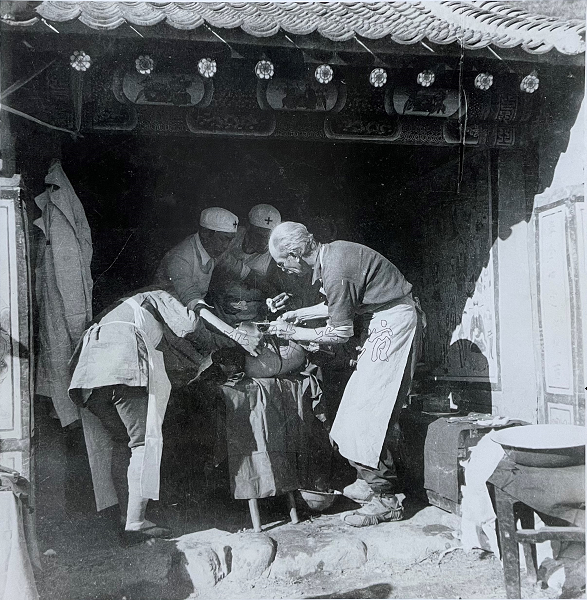Written by: Xiang Guanqi on 26 December 2024

Each year, hundreds of thousands of Chinese flock to Shaoshan in Hunan Province. Shaoshan is the birthplace of Mao Zedong, and the family home still stands. People go there throughout the year to show their respect for Chairman Mao, with the two peak periods being Chinese New Year and today, December 26, Mao’s birthday.
Last year was significant as the 130th anniversary of Mao’s birth. Those who missed out last year are arriving in large numbers. At the beginning of 2024, in just 8 days, more than 680,000 people went to Shaoshan to pay New Year's greetings to Chairman Mao, and according to the statistics analysed by reporters, among the tourists who came to Shaoshan, the proportion of "post-60s and before" was about 28%, and the proportion of post-90s + post-00s was as high as 32%.
Mao’s Selected Works are also being sought out, and most of the people searching for them are young people aged 20-29. Why, then, do fashionably dressed young people with trendy ideas become so interested in these old books and these things that are said to be "outdated"?
Comrade Xiang Guanqi, now in his 80s, a noted critic of China’s restored capitalism, says in this excerpt from one of his writings, it is more than nostalgia – Eds.
Maoism stresses the need for socialist society to revolutionise the whole of society and to strive to create a new socialist society that is truly and fundamentally different from capitalist private society, as the first stage of communist society. This is an important and profound element of Maoism's theory of continued socialist revolution.
Under the guidance of the Maoist general principle and strategy of correctly dealing with internal contradictions among the people, Chairman Mao personally took the lead in advocating the development of the communist spirit among the whole nation, and in the activity of ‘Learning from Comrade Lei Feng’, led the whole nation to endeavour to bring about a revolution in their thinking; and a number of advanced and exemplary figures appeared on various fronts as models for the whole nation to follow. At the same time, taking the nature of internal contradictions among the people as a prerequisite, we implemented the formula of ‘unity, criticism and unity’ to help the backward people to overcome some of the shortcomings and errors in their thinking and actions, and to gradually strengthen the transformation of their own subjective world, so that they could achieve, step by step, the revolutionisation of their thinking, and to keep pace with the requirements of the times for building socialism.
The famous ‘May 7 Instruction’, written by Chairman Mao on 7 May 1966, is the theoretical idea of building a genuinely new socialist society, a new innovation of the international communist movement.
It is not a long text, so it is worth quoting in full here:
Dear Comrade Lin Piao,
I have received the report from the Rear Service Department which you sent me on 6 May. I think it is an excellent plan. Is it possible to send this report to all the military districts and ask them to hold discussions of it among the cadres at the army and division levels? Their views should be reported to the Military Commission and through it to the Centre for approval. After that, suitable directives should be issued to them. Please consider this .
In the absence of a world war, our army should be a big school. Even under conditions of the third world war, it can still serve as a big school. In addition to fighting the war, it must do other work. In the eight years of the second world war, did we not do just that in the anti-Japanese base areas? In this big school, the army should learn politics, military affairs, and culture, and engage in agricultural production. It can build up its own middle- and small-size workshops to produce goods for its own use and the exchange of other goods of equal value. It can take part in mass work, factory work, and rural socialist education. After socialist education, there are always other kinds of mass work for it to do, to unite the army and people as one. The army should also participate in the revolutionary struggle against capitalist culture. In this way, it carries out military-educational, military-agricultural, military-industrial, and military-civilian work.
Naturally, should be properly coordinated and a distinction should be made between major and subsidiary work. A unit can select one or two from the agricultural, industrial, and civilian combination, but not all three. In this way, the tremendous power of several million soldiers will be felt.
Likewise, workers should, in addition to their main industrial work, learn military affairs, politics, and culture, and take part in the socialist educational movement and in criticizing the capitalist class. Under adequate conditions, they should also engage in agricultural production, following the example of the Daqing Oilfield.
The communes do their main agricultural work (including forestry, fishing, animal husbandry, and subsidiary trades), but they must also learn military affairs, politics, and culture. When circumstances allow, they should collectively set up small-scale factories and take part in criticizing the capitalist class.
The students are in a similar position. Their studies are their chief work; they must also learn other things. In other words, they ought to learn industrial, agricultural, and military work in addition to class work. The school years should be shortened, education should be revolutionized, and the domination of our schools by bourgeois intellectuals should by no means be allowed to continue.
Under favourable conditions, people in commerce, service trades, and party and government offices should do likewise.
What has been said above is neither new nor original. Many people have been doing this for some time, but it has not yet become a widespread phenomenon. Our army has been working in this way for decades. Now it is on the threshold of new developments.
When it comes to a new socialist society, the new China of that time under the leadership of Chairman Mao was indeed a new society, a new society in which the whole society was filled with the spirit of communism. It was a great creation. If we look at China at that time not only at the level of development of the productive forces, but also at the level of the comprehensive development of society as a whole, and especially at the level of development of human beings, we can say without exaggeration and in all truthfulness that China had surpassed not only the Soviet Union, but also the developed capitalist countries of the West.
Lei Feng was learnt everywhere. Under the leadership of Chairman Mao, China was truly an advanced socialist country holding aloft the red flag of Marxism-Leninism-Maoism; it was a new society in which ‘one person is for all, and all people are for one person’, in which there was both liveliness and unity of will, in which the free development of each individual was united with that of the whole society; and this was the road to the realisation of the historical task of socialism and to communism step by step.
Nowadays, many people do not understand why people of the older generation who came from that era are always nostalgic for a time when the economy was not yet developed, when life was not yet affluent, and even when many people were still poor. The answer lies in the fact that Chairman Mao led the entire nation to create a new society full of the spirit of communism and nurtured a new generation of people who adopted the communist ideology as their outlook on life.
Just as the revolutionary mentors taught, once human beings completely got rid of their animal nature and the alienation brought about by private ownership, and truly began to live as human beings, the free and happy life of human beings also began. Today's nostalgia for Chairman Mao's era is precisely a reflection of people's longing for the pursuit of this free and happy life of mankind - the life of communism.
This can in no way be described as ‘nostalgia’, but rather as ‘seeking newness’.








